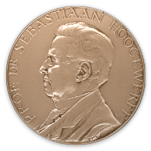
Leerstoel Product-driven Process Technology (2008-2012)
Prof.dr.ir. P.M.M. Bongers
In March 2008, dr.ir. P.M.M. (Peter) Bongers (1960-2012) was appointed as professor at the Eindhoven University of Technology, to continue the part-time chair on “Product-driven Process Technology” in the Department of Chemical Engineering and Chemistry.
Prof.dr.ir. Peter Bongers graduated in mechanical engineering (1986) at Delft University of Technology in 1996. He gained his PhD (1994) with a thesis in the field of systems and control theory, entitled ‘Modelling and identification of flexible wind turbines and a factorisational approach to robust control’. In 1994 he joined Unilever Research in Vlaardingen. In Unilever he fulfilled various positions:
- Manufacturing research Vlaardingen (Developing dynamic process models to improve and design processing operations)
- Ice cream Colworth House, UK (Developing new ice cream process & design/build prototype)
- Ice cream factory Wilp & Hellendoorn (Installing new ice cream process equipment; Developing and implement new down-stream processing and equipment; Transferring the whole portfolio to the new process)
- Operations Group Ice Cream Europe (Rolling-out new ice cream process in all large European factories)
- Unilever Foods Research (Leading Skill base Process Systems Engineering; Establishing a product-driven process synthesis approach to our process design).
In Eindhoven, prof. Bongers continued the part-time chair “Product-driven Process Technology” in the Department of Chemical Engineering and Chemistry. Next to continuing the present master and PDEng courses, he also started a research program.
WHY PRODUCT-DRIVEN PROCESS TECHNOLOGY?
Chemically structured products are ubiquitous in the agricultural, chemical, food and beverage, consumer products and pharmaceutical industries. These complex, multiphase materials include specialty chemicals, granulated powders, compressed or extruded solids, emulsions, suspensions, and other complex solids/fluids. The global marketplace demands a greater rate of innovation and students educated in rapid new product development are needed if developed counties are to compete in the global marketplace. The design and manufacturing of chemically structured products is a formidable task due to the complex effect of chemical formulation, processing and formation on end-use properties. These products are currently developed through trial-and-error experimental methodologies that are resource intensive and substantially slow the time to market.
A structured methodology is needed that allows a more efficient design of chemically structured products and reduces the time for these products to reach the marketplace.
Research and education activities should focus on manufacturing technologies and processes and their interaction with product structure and end-use performance.

